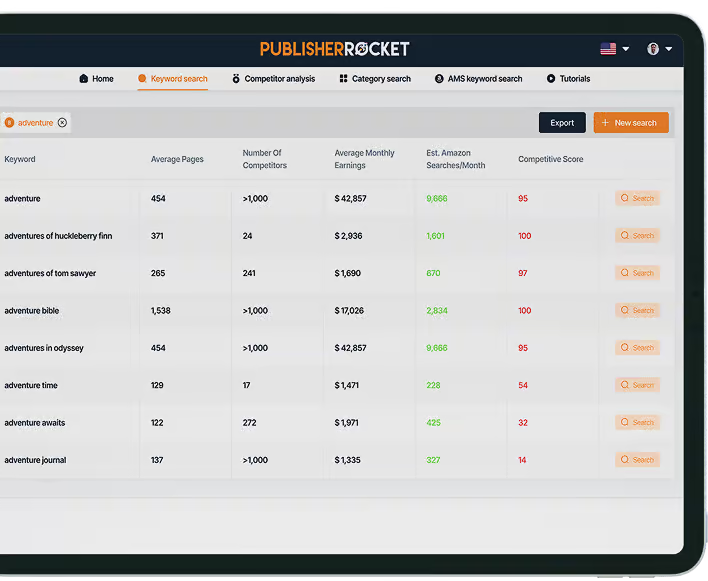Even the best writers burn out.
The words you once loved feel heavy, ideas that used to thrill you now feel exhausting, and just putting your hands on the keyboard can feel like a chore.
If you’ve felt it, you know it’s more than a dry week or a creative slump. It drains your energy, saps your creativity, and sometimes even chips away at your confidence. Yet most writers stumble through it blindly, blaming themselves, their habits, or their discipline.
This article is here to fix that.
We’ll start by untangling writer’s block from true writing burnout, because the solutions aren’t the same. Then, we’ll cover actionable ways to recover when burnout hits. Finally, we’ll lay out steps to prevent it from sneaking up on you again.
What’s the Difference Between Writer’s Block and Burnout?
When writing slows to a crawl, it’s easy to assume you’re just “blocked.” But writer’s block and burnout are not the same thing and treating them as interchangeable can make recovery slower, more frustrating, and way more stressful.
Writer’s block is situational.
You’re staring at the page, struggling to find the right word, sentence, or idea. Your brain feels stuck, but your energy, motivation, and enjoyment of writing might still be intact. It’s usually short-term, triggered by a tricky scene, a complex concept, or sometimes just the pressure of perfectionism.
The key is that you want to write, you just can’t figure out how in that moment.
Writer burnout, by contrast, runs much deeper. It’s not just a momentary creative stall, it’s chronic fatigue, emotional exhaustion, and a creeping sense of disconnection from the work you used to love.
Burnout makes you dread writing, procrastinate in ways that aren’t typical, and feel like no amount of caffeine, motivation, or tricks will fix it. It’s your body and mind telling you that the current pace, workload, or approach isn’t sustainable.
Here’s a simple litmus test:
If you’re blocked, you can usually shake it off by changing your environment, trying a freewriting exercise, or taking a short mental break.
If you’re burnt out, those fixes might provide temporary relief, but the underlying problem (too much, too fast, or without balance) remains. Recovery requires a broader approach, like reevaluating your habits, managing your energy, and sometimes even stepping away entirely to reset.
Knowing the difference matters because it determines your next step.
Treat a block like burnout, and you’ll waste energy on the wrong solutions. Treat burnout like a block, and you’ll push too hard, risk deeper exhaustion, and prolong the cycle.
Understanding which problem you actually have is the first step toward getting back to writing without pain or guilt.
How to Prevent Writing Burnout
Preventing burnout is always better than fixing it after the fact.
Once the exhaustion sets in, recovery takes time, and sometimes that time comes at the expense of your projects, your deadlines, or your own sense of confidence.
The goal is to build a sustainable writing life that protects your energy and keeps your creativity alive. Here’s how I approach it.
1. Build a Writing Habit That Fits Your Life
Consistency is the secret ingredient most people overlook.
I’m not talking about grinding out five hours every day if that doesn’t fit your schedule. I mean setting up a routine that your brain and body can rely on.
Maybe it’s 30 minutes before breakfast, maybe it’s an hour after the kids go to bed. The point is rhythm. When writing becomes a predictable part of your day, your brain doesn’t waste energy negotiating whether you should write, it just does.
That reduces mental friction and keeps burnout from sneaking up on you.
2. Treat Your Body Like Part of Your Writing Process
Your mind does the thinking, but your body does the work.
Poor diet, no exercise, and little sleep compound stress over time, making burnout more likely. Writing in a foggy brain or on a sore back doesn’t just feel miserable, it erodes focus and motivation.
Even small improvements (a short walk, drinking more water, switching to whole foods) can drastically improve stamina and mood.
I’ve seen this firsthand. When I started prioritizing sleep and daily movement, my writing output increased not because I pushed harder, but because my energy levels finally supported the work I wanted to do.
3. Schedule Breaks Before You Need Them
Burnout often comes from waiting too long to rest.
Instead of seeing breaks as a reward, treat them as part of the workflow. Short breaks every hour, a full day off once a week, a long weekend each quarter… these aren’t indulgences, they’re maintenance.
Your brain needs downtime to process ideas, recharge, and avoid cognitive fatigue. I use this approach religiously. When I ignore it, deadlines still get met, but the work is joyless, creativity suffers, and exhaustion sets in.
Build your breaks into the schedule, and your writing life becomes something you can sustain indefinitely.
4. Mix Up Your Creative Muscle
Sticking to one type of writing can slowly dull enthusiasm. Burnout often hits hardest when you feel trapped in a single genre, project, or format.
The solution? Explore other outlets.
Write a personal essay, try poetry, draft a short story, or even journal your thoughts.
Switching creative gears refreshes the mind, sparks new ideas, and reminds you why writing is fun in the first place. I personally rotate between emails, sales copy, and blog posts to keep my brain engaged without overloading it.
5. Clarify Your Why and Revisit It Often
Why are you writing?
For money, self-expression, career growth, or simply because it makes you happy?
The answers aren’t always the same every year, and that’s fine. But knowing your why keeps your writing anchored.
When I feel the first signs of burnout, I take a step back and reconnect with my original motivations. That reflection often reminds me that imbalance, not stress, is the enemy.
Burnout usually comes from misalignment between what you value and how you spend your time, so being intentional with “your why” protects both your energy and your focus.
6. Create a Support System
Even the most disciplined writers need external reinforcement.
Having someone to discuss ideas with, celebrate wins, or commiserate on tough days can buffer the mental toll of constant creative work.
This doesn’t have to be a formal mastermind group… it could be a trusted friend, spouse, or fellow writer.
The key is finding people who understand your goals and encourage progress without judgment. Isolation amplifies burnout, while connection can prevent it before it starts.
7. Set Boundaries and Learn to Say “No”
Every opportunity that comes your way competes for your attention and energy.
Learning to say no doesn’t make you lazy or unambitious… it protects your ability to focus on what truly matters.
If a writing project, freelance gig, or collaboration drains you without meaningful returns, declining it is an act of long-term preservation. I’ve found that once I started guarding my time aggressively, I could focus more fully on my writing, producing better work without feeling like I was constantly spinning plates.
8. Keep Learning, Keep Experimenting
Growth keeps the creative fire alive.
Burnout often strikes when the work feels stagnant or repetitive. Explore new techniques, read outside your usual genres, experiment with new tools or software, and challenge yourself to stretch creatively.
The curiosity and novelty help prevent mental fatigue, keeping the act of writing fresh and engaging. Every experiment doesn’t need to be a masterpiece (the value comes from stimulation, perspective, and renewed energy).
9. Guard Your Creative Calendar
Burnout often sneaks in when life fills every gap with “shoulds” and deadlines.
One of the strongest defenses is to protect your creative time like it’s a non-negotiable appointment (the kind where, if you cancel, you lose money).
Schedule writing sessions, but also schedule thinking time, reading, or even just staring out the window. Treat these blocks as sacred, and communicate them clearly to anyone who might try to hijack them (I'm looking at you, beautiful daughters of mine).
You're not being rigid for the sake of being rigid. No, you're giving your creativity breathing room.
When your writing time has a protected container, it’s easier to sustain over months and years, and burnout loses its grip before it even starts.
10. Celebrate Wins Along the Way
Finally, give yourself permission to celebrate progress.
Burnout often comes from relentless pressure and unacknowledged effort. Completing a chapter, hitting a writing streak, or even nailing a single paragraph deserves recognition.
Reward yourself in ways that reinforce your health and happiness. Train your mind to associate writing with achievement and satisfaction, not stress and exhaustion.
How to Recover from Writing Burnout
Even with the best prevention strategies, burnout sometimes finds its way in.
Recovery isn’t about magic fixes or “grit it out” mental toughness. No, you'll need to deliberately rebuild your energy, reconnect with your work, and reclaim the joy that brought you to writing in the first place.
Here’s what that process looks like when you approach it intentionally.
1. Step Back Without Guilt
The first and most important thing you need to do is give yourself permission to pause.
This can feel impossible for writers with deadlines, expectations, or self-imposed pressure. But exhaustion is a warning. Stepping back, even briefly, allows your brain to stop running on fumes and start recalibrating.
I’ve had to take weeks off before so I could recover. During this time, I don’t measure output, I measure clarity, energy, and curiosity.
2. Reconnect With Non-Writing Joys
Oftentimes, burnout is about life imbalance.
When you’re depleted, your whole mental ecosystem is out of whack. Take time to do the things that make you feel alive outside of writing: go for a hike, cook a good meal, read a book that’s purely fun, or just sit in a coffee shop and watch the world.
These activities might feel “unproductive,” but they're actually critical repairs. They remind you that your mind has more to give, and that creativity thrives on life outside the page.
3. Write Something Small
When burnout hits, thinking about finishing a chapter, a blog post, or writing an entire book can feel impossible.
So stop thinking big.
Focus on something tiny instead. Write a paragraph. Draft a single sentence. Sketch a character idea on a sticky note.
The goal isn’t to finish anything. Just get words on the page.
You’re reminding your brain that writing isn’t punishment… it’s something you can still do, even in tiny doses.
4. Reevaluate Your Systems
Burnout often exposes cracks in your routines, habits, or expectations, so this is the perfect time to audit how you work.
Are your writing blocks too long or too unstructured? Are your deadlines unrealistic? Are your breaks non-existent?
Fixing the process prevents the burnout cycle from repeating. I’ve found that when I rebuild my workflow intentionally after a burnout, I return to writing stronger, more focused, and far less stressed.
5. Talk It Out
Burnout thrives in isolation, so sharing your experience with another writer, a friend, or a mentor can lighten the mental load.
Sometimes just verbalizing the fatigue, frustration, or disillusionment validates your experience and makes the next steps clearer. Others may offer perspectives, strategies, or encouragement that you wouldn’t have thought of alone.
Writing doesn’t have to be a lonely endeavor, and leaning on your support network is a critical part of recovery.
6. Reclaim Your Curiosity
One of the hidden casualties of burnout is curiosity.
That spark that makes you want to explore a character, a scene, or a concept often fades when you’re running on empty. That's why you need to allow yourself time to play, to experiment, and to follow ideas that excite you.
Don’t worry about outcomes, deadlines, or perfection. Just feel the thrill of creation again.
7. Reinforce Small Wins
As you start producing again, don’t ignore the small victories. Finishing a page, completing a paragraph, or even committing to a 20-minute writing session deserves acknowledgment.
Burnout leaves you fixated on what hasn’t been done. Recovery, on the other hand, is about noticing what you have done.
These micro-successes build momentum, rebuild confidence, and slowly make the work feel joyful again.
9. Adjust Your Expectations
Finally, it's important that you recover with realistic expectations.
Burnout changes how your mind and body respond. You might not hit your previous productivity levels immediately, and that’s okay. Pushing too hard too soon risks relapse.
Instead, measure progress in energy, clarity, and engagement rather than word count alone. Over time, your rhythm will return, often stronger and smarter than before because you’ve learned what your limits truly are and how to respect them.
You Can Overcome Writing Burnout
There isn't a single, magic solution for roundhouse kicking burnout in the face.
It’s about stacking small habits, routines, and mindsets that give your brain the space to breathe. Sleep better, organize your day, reconnect with why you write, then repeat.
Some days you’ll feel unstoppable, some days you’ll feel stuck. Both are part of the process. The key is showing up anyway, even if it’s just a few words at a time.
That’s how you win the long game.
You got this. Good luck.
—
An earlier version of this article was authored by Jason Hamilton. It has been rewritten for freshness and comprehensiveness.





